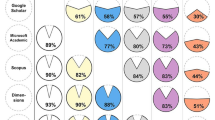Abstract
This paper deals with the question of problem selection by scientists, in particular scientists residing and working in small national communities. Do such scientists take their cue from the immediate environment and accept as their task the application of knowledge to national development? Or do they consider themselves members of an international scientific fraternity and adopt the problems defined by the leading luminaries at the major centers? The data presented here were collected in one small scientific community, that of the Republic of Ireland. We conclude that an Irish scientist's integration with foreign colleagues (and presumably his willingness to accept their influence) is a function of (1) the relevance of his/her work to the Irish economy i.e. the existence or non-existence of local rewards, and (2) the state of paradigm development in his/her field. If work on national problems is rewarded, then this alone can be expected to wean a scientist away from excessive reliance on foreign colleagues.
Similar content being viewed by others
References
Allen, Thomas J. 1966Managing the Flow of Scientific and Technological Information. Alfred P. Sloan School of Management, Massachusetts Institute of Technology: Cambridge, Massachusetts. Unpublished Ph.D. dissertation.
Allen, Thomas J. 1967 “Communications in the Research and Development Laboratory”,Technology Review. 70 (1):31–38.
Allen, Thomas J. 1969Meeting the Technical Information Needs of Research and Development Projects. Alfred P. Sloan School of Management, Massachusetts Institute of Technology: Cambridge, Massachusetts. Working Paper No. 431-69.
Allen, Thomas J. 1969(b)Roles in Technical Communication Networks. Alfred P. Sloan School of Management, Massachusetts Institute of Technology: Cambridge, Massachusetts. Working Paper No. 434-69.
Allen, Thomas J. and Stephen J. Cohen 1969 “Information Flow in Research and Development Laboratories”,Administrative Science Quarterly, 14, 12–19.
Allen, Thomas J., James M. Piepmeier and Sean Cooney 1971 “The International Gatekeeper”,Technology Review, 73 (5), 36–43.
Becker, Marshall 1970 “Factors Affecting the Diffusion of Innovations Among Health Professionals”,American Journal of Public Health. 60 (2), 294–304.
Coleman, James, Elihu Katz and Herbert MenzelMedical Innovation: A Diffusion Study, Bobbs-Merrill: New York.
Crane, Diana 1969 “Social Structure in a Group of Scientists: A Test of the ‘Invisible College’ Hypothesis”,American Sociological Review, 34, 335–52.
Crane, Diana 1972Invisible Colleges: Diffusion of Knowledge in Scientific Communities University of Chicago Press: Chicago.
Farris, George 1971Colleague Roles and Innovation in Scientific Teams Alfred P. Sloan School of Management, Massachusetts Institute of Technology: Cambridge, Massachusetts. Working Paper No. 552-71.
Gerstberger, Peter 1971The Preservation and Transfer of Technology in Research and Development Organizations. Alfred P. Sloan School of Management, Massachusetts Institute of Technology: Cambridge, Massachusetts. Unpublished Ph.D. dissertation.
Hagstrom, Warren 1965The Scientific Community. Basic Books: New York.
Herzog, Arnold 1975Colleague Networks, Institutional Roles and the International Transfer of Scientific Knowledge: The Case of Ireland. Alfred P. Sloan School of Management, Massachusetts Institute of Technology: Cambridge, Massachusetts. Unpublished Ph.D. dissertation.
Katz, Elihu and Paul Lazarsfeld 1955Personal Influence: The Part Played by People in the Flow of Mass Communications. The Free Press: New York.
Katz, Daniel and Robert Kahn 1966The Social Psychology of Organizations. John Wiley and Sons, Inc.: New York.
McCarthy, William 1972 Unpublished M.S. thesis. Alfred P. Sloan School of Management, Massachusetts Institute of Technology: Cambridge, Massachusetts.
Menzel, Herbert 1962 “Planned and Unplanned Scientific Communication”, in Bernard Barber and Walter Hirsch (eds.),The Sociology of Science. The Free Press: New York, 417–441.
Merton, Robert 1962 “Priorities in Scientific Discovery: A Chapter in the Sociology of Science”, in Bernard Barber and Walter Hirsch (eds.),The Sociology of Science. The Free Press: New York, 447–485.
National Science Council, Royal Irish Academy 1971Register of Scientific Research Personel Stationary Office: Dublin.
Price, Derek de Solla 1963Little Science, Big Science Columbia University Press: New York.
Price, Derek de Solla 1970 “Citation Measures of Hard Science, Soft Science, Technology and Nonscience”, in C. Nelson and D. Pollack (eds),Communication Among Scientists and Engineers. D. C. Heath: Lexington, Mass., 3–22
Snedecor, George W. and William G. Cochran 1967Statistical Methods. Iowa State University Press: Ames, Iowa, 6th Edition.
Storer, Norman 1966The Social System of Science. Holt, Rinehart and Winston: New York.
Author information
Authors and Affiliations
Rights and permissions
About this article
Cite this article
Herzog, A.J. The ‘gatekeeper’ hypothesis and the international transfer of scientific knowledge. J Technol Transfer 6, 57–72 (1981). https://doi.org/10.1007/BF02173260
Issue Date:
DOI: https://doi.org/10.1007/BF02173260



